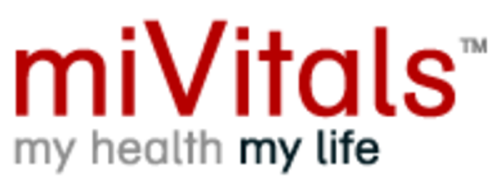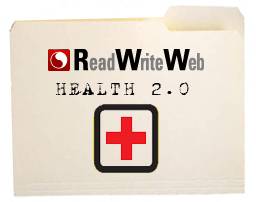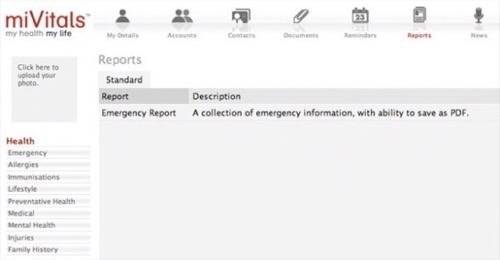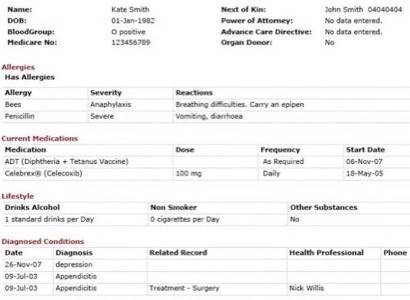miVitals is a new Australian startup that has an ambitious goal: to enable individuals to manage their personal health data via a web application. miVitals describes itself as “a secure online storage system for health and lifestyle records”. The company says that “most people have about 5 professionals involved in their health management: GP, dentist, optician, specialist, pharmacist.” So miVitals aims to be a central repository of a person’s health data – and in future to enable them to share relevant pieces with health professionals and family.

Probably the main point is that miVitals wants to give consumers control over their own health data. If that theme sounds familiar, it’s because OpenID and similar initiatives aim to do the same thing for your social networking and other identity data on the Web. Control of one’s data is a key driver for many new web apps today.
Note: this post is the start of a special investigation series into Web-enabled healthcare, sometimes referred to as ‘health 2.0’. Over the next few weeks ReadWriteWeb will be looking at recent examples of healthcare web apps and the general trend of utilizing the Internet in the healthcare industry. If you have a healthcare app that you’d like us to take a look at, please email [email protected] and include the word ‘health’ in the subject line.

miVitals Target Audience
miVitals is targeting a global audience, including Australia, USA, Canada and the UK. The core health module is available for free, but the company plans to introduce premium services in the future.
As mentioned above, it’s a consumer app – and at this stage isn’t integrated into healthcare systems. More on that below, but we should note that miVitals isn’t claiming to replace medical records. Instead it provides users with “a place for complete history of relevant health information, in much the same way people currently manage their own financial information.” An example given is of a healthy thirty year old professional whose occupation requires extensive international travel. This person, named Brian, “records his regular exercise and keeps track of his immunisations, doctors visits and blood pressure using miVitals.”
Features
Currently miVitals offers features such as the ability to store your medical records, manage accounts for your family, record appointments, create an emergency report. Coming soon are further reports, graphing functionality, mobile phone funcntionality, the all-important ability to share information with health care professionals, and more. Right now, miVitals seems light in features.
miVitals UI

Example emergency report

Issues: Privacy & Integration with Health Systems
miVitals sounds great in theory, and the current app is functional enough. But of course when it comes to health data there are a couple of key issues to overcome:
1) Ensuring that the data is ultra secure and that all privacy bases are covered; and
2) Getting healthcare professionals to use the system.
miVitals has a Privacy Policy that goes some way to covering the first issue. You still need to convince consumers that their data is truly safe on the Web – which with very personal data like health, is a tough ask. Even I’m not fully comfortable storing my health data online yet.
But the second issue is probably the biggest – and will require integration with existing healthcare IT systems. I asked miVitals if integration with other health systems is on the cards? A miVitals representative told me that yes, it is “absolutely on the development path for the future, along with professionals access to reports that users generate.”
However, integration is a huge obstacle and one that many startups have tried to solve before, including in the original ‘dot com’ era. One that springs to mind is Jim Clark’s famous Healtheon startup – as outlined in Michael Lewis’ must-read dot com book The New New Thing, Clark (the co-founder of Netscape and one of Silicon Valley’s enduring folk heroes) set out to revolutionize the healthcare industry in the US via an Internet startup named Healtheon. As the Wikipedia notes, Healtheon “developed software that essentially placed their company between physicians, patients, and health care institutions, eliminating unnecessary paperwork and facilitating networking and communication amongst the three.” Although initially unsuccessful, in late 1999 Healtheon merged with the Microsoft-backed WebMD – and today the combined entity is considered the leading health portal.
Crowded Market
One of miVitals’ problems is that WebMD already does what miVitals sets out to do. As Sramana Mitra pointed out in September, “apart from offering articles and diagnostic tools, [WebMD] allows users to store their health records for easy access as they visit different doctors.” See also Sramana’s analysis of other online health providers.
Plus don’t forget that Google is eyeing up the lucrative online health market too! Google is very well placed to offer a web app that organizes users health data, seeing as organizing the world’s information is its core mission.
Conclusion
miVitals is an ambitious app, but the competitive landscape is very tough – and will only get tougher once Google enters the fray.
Also as of now, miVitals essentially requires individuals to do two key things. Firstly, you must obtain your health data from healthcare providers. This is actually no easy task – I have trouble getting my doctor’s office to send prescriptions to my local chemist, let alone getting the data for my own use! Even if you get the data, you then need to enter it into miVitals. Or if you’re lucky, you’ll get an electronic version – but once again red tape from the health system will likely prevent that.
In other words, the lack of integration with current health systems puts up a big obstacle. This is not a new issue; and it won’t be fully solved for years to come. Anyone who has dealt with healthcare systems before (which is most of us) knows how tricky and frustrating it is.
One final issue with miVitals: as a user, you’ll need to be motivated by your circumstances to enter data into miVitals. While the 30 year old who travels frequently (noted above) has good reason to have a central repository of his health data, this won’t be the case for most people. Take me for example: I travel every few months and I have diabetes. But rather than enter my health data into a new system, I’m more inclined to just put some key paper records into my suitcase every time I travel. Unfortunately, any time that you need to duplicate data entry or enter data into a system when there isn’t a compelling reason, it puts an extra barrier on web apps.
miVitals does get a lot of points from me for its initiative and goals. Plus the web app itself is nice and the UI nifty. Overall, in theory the app is great. But there are a lot of practical issues to overcome, plus some very big players already in the market – or about to enter it.





















